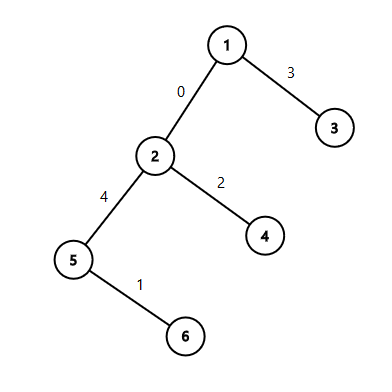You are given a tree consisting of $n$ nodes. You want to write some labels on the tree’s edges such that the following conditions hold:
- Every label is an integer between $0$ and $n-2$ inclusive.
- All the written labels are distinct.
- The largest value among $MEX(u,v)$ over all pairs of nodes $(u,v)$ is as small as possible.
Here, $MEX(u,v)$ denotes the smallest non-negative integer that isn’t written on any edge on the unique simple path from node $u$ to node $v$.
Input
The first line contains the integer $n$ ($2 \le n \le 10^5$) — the number of nodes in the tree.
Each of the next $n-1$ lines contains two space-separated integers $u$ and $v$ ($1 \le u,v \le n$) that mean there’s an edge between nodes $u$ and $v$. It’s guaranteed that the given graph is a tree.
Output
Output $n-1$ integers. The $i^{th}$ of them will be the number written on the $i^{th}$ edge (in the input order).
Examples
input
3 1 2 1 3
output
0 1
input
6 1 2 1 3 2 4 2 5 5 6
output
0 3 2 4 1
Note
The tree from the second sample:

Solution:
#include <bits/stdc++.h>
using namespace std;
#define rep(i,a,n) for (int i=a;i<n;i++)
#define per(i,a,n) for (int i=n-1;i>=a;i--)
#define pb push_back
#define mp make_pair
#define all(x) (x).begin(),(x).end()
#define fi first
#define se second
#define SZ(x) ((int)(x).size())
typedef vector<int> VI;
typedef long long ll;
typedef pair<int,int> PII;
typedef double db;
mt19937 mrand(random_device{}());
const ll mod=1000000007;
int rnd(int x) { return mrand() % x;}
ll powmod(ll a,ll b) {ll res=1;a%=mod; assert(b>=0); for(;b;b>>=1){if(b&1)res=res*a%mod;a=a*a%mod;}return res;}
ll gcd(ll a,ll b) { return b?gcd(b,a%b):a;}
// head
const int N=101000;
int n,u,v,lab[N];
vector<PII> e[N];
int main() {
scanf("%d",&n);
rep(i,1,n) {
scanf("%d%d",&u,&v);
e[u].pb(mp(v,i));
e[v].pb(mp(u,i));
}
rep(i,1,n) lab[i]=-1;
rep(u,1,n+1) if (SZ(e[u])>=3) {
rep(j,0,3) lab[e[u][j].se]=j;
int z=3;
rep(j,1,n) if (lab[j]==-1) lab[j]=z++;
rep(j,1,n) printf("%d\n",lab[j]);
return 0;
}
rep(j,1,n) printf("%d\n",j-1);
}

